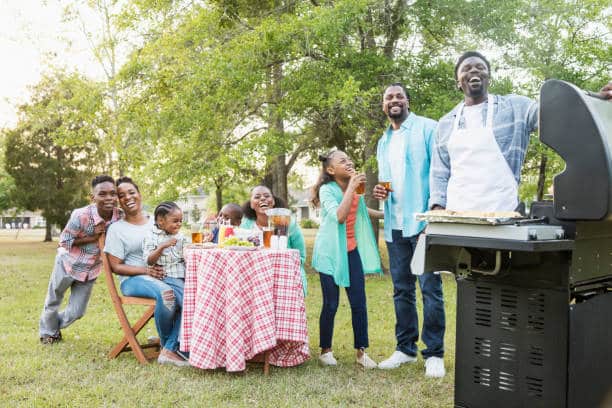
Family reunions are more than just soul food and old stories — they’re a chance to share something priceless: our health history. Between hugs and potato salad, we can ask questions that protect generations. “Grandma, when did you start having high blood pressure?” sounds like love, not worry — because it is.
Black families face higher risks of diabetes, heart disease, cancer, and high blood pressure. Talking about it while gathered in joy helps us catch patterns early and live longer, stronger lives together.

Why It Matters
The U.S. Surgeon General and the CDC encourage family gatherings to discuss health history. Just like we pass down recipes, we can pass down wellness. A breast cancer survivor once said that sharing health history “normalizes the conversation,” making her daughters educated and empowered, not afraid.
These talks aren’t scary. They’re sacred.
RELATED: Capture Your Family’s History, One Story At A Time!

Blending Culture & Health
Family is tradition. Amazing cuisine. Gospel. Folktales. Let’s add health to that mix.
- Healthy twists: Grill more lean meats, add colorful veggies, and cook greens with herbs or smoked turkey instead of salt or pork.
- Family storytelling: Ask relatives about known illnesses in the family tree. The CDC suggests doing this during holidays and reunions. Use the free “My Family Health Portrait” tool to track patterns (My Family Health Portrait).
- Faith & encouragement: Say a prayer of gratitude for healing or encourage a cousin managing a new diagnosis. Support builds resilience.
Turning Talk into Action
Once the conversation is open, help the family take steps forward:
- Mini check-ups: Bring blood pressure cuffs, glucose meters, or step counters. Show cousins how to check readings. Make it fun, not clinical.
- Know your screenings: Black men are more at risk for prostate cancer, and Black women face more aggressive breast cancers. Share screening ages and talk to doctors earlier if there’s a family history.
- Promote prevention: Diabetes and kidney disease hit our community harder. If it runs in the family, talk to a provider about tests like A1C and kidney function checks. These are simple, often overlooked, and can save lives.
Wellness That Feels Good
Health isn’t just physical — it’s spiritual, emotional, and cultural.
- Move together: Dance to old-school R&B, take a “health stroll” after eating, or let kids lead a fitness game. Movement keeps hearts and spirits strong.
- Bring Back the Fun: Reignite the joy of classic games by drawing hopscotch courts with chalk, setting up jump rope challenges, or playing Simon Says with a twist of squats and stretches. Hand clapping games and potato sack races (grab a few carnival bags!) aren’t just for kids — they spark movement, laughter, and sweet memories across generations. These playful moments open the door for stories, smiles, and meaningful connections.
- Share mental health tips: Stress is real. Share what works — scripture, deep breathing, or group prayer. Say, “I’m here for you,” and mean it.
- Normalize self-care: Encourage rest, good sleep, and digital detox time. And yes, therapy is strength, not shame.
RELATED: 3 Things Your Family History Could Tell You About Your Future
Use What’s Already in Your Pocket
Technology can help the whole family:
- Use group chats to share healthy recipes or reminders.
- Let tech-savvy teens set up family wellness apps or track steps.
- Know the limits of DNA kits — they’re fun, but not full medical guides. Always confirm concerns with a provider.
Quick Resource List
- My Family Health Portrait: My Family Health Portrait
- CDC Health History Tips: Family Health History and Adults
- National Cancer Institute: cancer.gov
- Kidney Health Info: kidney.org
- Mental Health Resources: mentalhealth.gov
The Bottom Line:
This summer, let’s not just feed the family — let’s fuel it. Blend tradition with health. Share stories. Swap recipes. Check pressures. Dance it out. Pray it in. We’ve always been strong. Now, let’s be strong together — in body, mind, and legacy.
Family is love. And love looks out.








